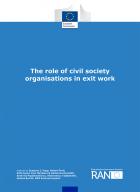Details
- Publication date
- 31 May 2022
- Author
- Directorate-General for Migration and Home Affairs
- RAN Publications Topic
- Community engagement/civil society
Description
In recent years, the importance of multi-agency work and collaboration between governments and civil society in exit work has increased significantly. With a growing number of exit programmes in Europe aiming to deradicalise individuals, prevent criminal offences and promote rehabilitation and reintegration into society, the awareness of exit work collaboration has grown. In several European Union (EU) countries, partnerships have extended to different government stakeholders (like prison and probation services, police and other municipal authorities) working with civil society organisations (CSOs) to design and co-implement sustainable exit programmes.
In key areas of rehabilitation and reintegration work, both inside and outside prison, governments are making increasing use of the evaluated expertise, skills and knowledge provided by CSOs. The need to strengthen government collaboration with civil society in the context of exit work has been highlighted in the European Commission’s ‘Strategic orientations on a coordinated EU approach to prevention of radicalisation for 2021.’ In recent years, the terms ‘exit work’ and ‘tertiary radicalisation prevention’ have become increasingly popular and relevant in the context of preventing and countering violent extremism (P/CVE). Following the rise of Daesh and the unprecedented mobilisation of foreign terrorist fighters (FTFs) to join its ranks in Iraq and Syria, countless organisations – both governmental and non-governmental – have focused on exit work and tertiary radicalisation prevention. However, neither are novel ideas.
In fact, for years, countries worldwide and especially in Europe have been developing and implementing programmes to stop individuals from mobilising to violence and help them disengage from violent extremism. For example, in the 1980s and 1990s, European countries including Germany, Sweden and Norway focused on deradicalising and reintegrating violent right-wing extremists such as neo-Nazis and skinheads. The late 1990s saw the signing of the Belfast Agreement (also known as the Good Friday Agreement), between the British and Northern Irish governments regarding the status of Northern Ireland. The accords included demilitarisation, demobilisation and reintegration (DDR) schemes for violent political actors such as the Irish Republican Army (IRA) and Loyalist extremists. These efforts were essentially exit programmes helping violent political actors pull away from terrorism and extremism and successfully reintegrate into society. Then, in 2001, al-Qaeda attacked the United States on 9/11 and carried out subsequent attacks in Madrid and London in 2004 and 2005, respectively.
Apart from resulting in thousands of casualties, these attacks also profoundly affected counterterrorism, which became focused primarily on the threat emanating from jihadist terrorism. With the outbreak of the Syrian civil war in 2011 and with Daesh declaring a caliphate in Iraq and Syria in 2014, the world saw a mass mobilisation of violent extremists to the war-torn region as well as the launching of attacks across Europe. Governments around the world came under pressure to develop and implement responses to the threat posed by returned and radicalised combatants. In 2014, the United Nations Security Council urged Member States to establish rehabilitation and reintegration measures for returning FTFs. The same year, the Revised EU Counter Terrorism Strategy recommended that Member States ‘consider designing and developing disengagement and exit strategies adapted to the culture and the specific context’.

